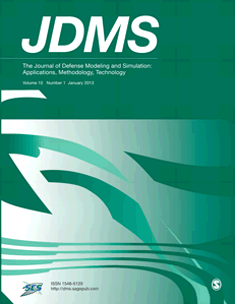
Journal of Defense Modeling and Simulation-Applications Methodology Technology-JDMS
Scope & Guideline
Transforming Defense Operations with Rigorous Research
Introduction
Aims and Scopes
- Modeling and Simulation Techniques:
The journal emphasizes various modeling approaches including agent-based, system dynamics, and discrete event simulation to analyze military operations and strategies. - Cybersecurity and Artificial Intelligence:
Research on the integration of AI and machine learning in defense applications, particularly in enhancing cybersecurity measures and operational efficiency. - Operational Analysis and Decision Support:
Focus on quantitative methodologies that support military decision-making processes, including wargaming, operational readiness assessments, and resource allocation. - Human Factors and Training:
Exploration of cognitive models, training methodologies, and human-machine interactions to improve military effectiveness and readiness. - Emerging Technologies in Defense:
Investigation of new technologies such as IoT, robotics, and advanced sensor systems that impact military operations and logistics. - Environmental and Structural Modeling:
Assessment of environmental impacts on military operations, including modeling of ballistic effects, terrain interactions, and material performance.
Trending and Emerging
- Adversarial Machine Learning:
The increasing focus on adversarial attacks and defenses in machine learning models highlights the importance of robust AI systems in command and control operations. - Integration of IoT in Defense Operations:
Research on IoT-enabled systems for enhancing situational awareness and operational efficiency is gaining traction, indicating a shift towards more interconnected military capabilities. - Enhanced Cyber Defense Mechanisms:
There is a growing emphasis on advanced cybersecurity frameworks and methodologies that address the complexities of modern cyber threats faced by military systems. - Data-Driven Decision Making:
The trend towards using big data analytics and machine learning for operational decision-making processes is becoming more pronounced, reflecting a shift towards data-centric military strategies. - Human-Machine Teaming:
Research focusing on the interaction between human operators and automated systems is emerging, emphasizing the need for effective collaboration in high-stakes military environments. - Resilience and Adaptability in Military Planning:
Studies that explore adaptive strategies and resilience in military logistics and planning processes indicate a growing recognition of the need to respond dynamically to unpredictable operational environments.
Declining or Waning
- Traditional Wargaming Techniques:
While wargaming remains important, traditional methods that do not incorporate advanced simulation technologies or AI have seen a decline as researchers gravitate towards more innovative and integrated approaches. - Basic Cybersecurity Concepts:
Research focusing solely on foundational cybersecurity principles without application to advanced technologies or scenarios has diminished as the field evolves towards more complex threat environments. - Conventional Military Strategy Analysis:
Studies that analyze military strategies using conventional frameworks without incorporating modern complexities like cyber warfare or hybrid threats are becoming less prevalent. - Static Simulation Models:
There is a noticeable decline in the use of static models that do not account for dynamic changes in the operational environment, as researchers seek more adaptable and responsive modeling techniques. - Single-Domain Focus Studies:
Research that focuses exclusively on one domain (land, air, or sea) without considering joint or multi-domain operations is waning as the complexity of modern warfare demands more integrated approaches.
Similar Journals

SIMULATION MODELLING PRACTICE AND THEORY
Elevating Knowledge in Simulation Modeling Across Disciplines.SIMULATION MODELLING PRACTICE AND THEORY is a leading academic journal published by Elsevier that focuses on the dynamic and evolving fields of simulation modeling and its applications across various disciplines. Established in 2002, this journal has rapidly gained recognition within the academic community, achieving a prestigious Q1 ranking in both Hardware and Architecture, as well as Modeling and Simulation for 2023. With an impressive impact factor that reflects its significance, it offers essential insights and findings pertinent to researchers, professionals, and students alike. The journal's scope encompasses a wide array of topics, encouraging interdisciplinary collaboration and innovation. Open access options further enhance visibility and accessibility of published research, contributing to the dissemination of knowledge in this critical field. Operating from its base in Amsterdam, Netherlands, SIMULATION MODELLING PRACTICE AND THEORY continues to provide a vital platform for advancements in simulation methodologies and applications, fostering an environment where theoretical principles and practical implementation converge.

DEFENCE SCIENCE JOURNAL
Pioneering Research for National and Global SecurityDEFENCE SCIENCE JOURNAL, published by the DEFENCE SCIENTIFIC INFORMATION DOCUMENTATION CENTRE, is a distinguished journal dedicated to advancing knowledge in the fields of defence science and technology. With a history that spans over five decades, the journal has been a pivotal platform for researchers and professionals to publish innovative findings and engage in interdisciplinary discussions across diverse categories including Biomedical Engineering, Chemical Engineering, Computer Science Applications, and Mechanical Engineering, among others. It is indexed in Scopus, reflecting its impact and relevance, including a ranking of #55 in Multidisciplinary studies, underscoring its broad-based influence within the academic community. Despite the lack of open access options, the journal remains a valuable resource for those seeking to stay informed on cutting-edge research and developments in defence science. With launching convergences from 1970 to 2024, it continues to evolve, aiming to foster the exchange of ideas that enhance national and global security, making it an essential read for students, researchers, and practitioners alike.
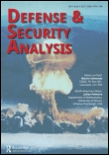
Defence and Security Analysis
Advancing Insights in International Relations.Defence and Security Analysis is an esteemed journal that focuses on the critical intersections of security studies, international relations, and geopolitical dynamics. Published by Routledge Journals, Taylor & Francis Ltd in the United Kingdom, this journal serves as a vital platform for scholars, practitioners, and students to disseminate innovative research and insights concerning contemporary defence and security issues. With an ISSN of 1475-1798 and an E-ISSN of 1475-1801, it has achieved a commendable standing, ranking in the Q2 category for Political Science and International Relations and Q3 for Geography, Planning and Development as of 2023. The journal covers a range of pertinent topics with a dedicated convergence of years from 2003 to 2024, making it an invaluable resource for anyone looking to engage deeply with this evolving field. Although it is not open access, its rich content is crucial for informing policy and academic discourse on global security challenges.
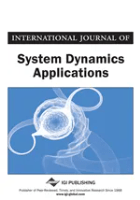
International Journal of System Dynamics Applications
Exploring Innovative Methodologies for Complex Systems.The International Journal of System Dynamics Applications (ISSN: 2160-9772; E-ISSN: 2160-9799), published by IGI Global, serves as a premier platform for scholars, professionals, and students in the field of system dynamics. This journal aims to promote the advancement of theory and practice in system dynamics, providing critical insights and innovative methodologies that address complex real-world systems across various disciplines, including engineering, economics, and social sciences. Although not an open-access journal, it ensures a rigorous peer-review process, maintaining high standards of scientific integrity and quality in every published paper. With its commitment to disseminating cutting-edge research and practical applications in system dynamics, this journal plays a vital role in shaping contemporary discourse and fostering collaborative efforts within this essential field. The address for correspondence is 701 E Chocolate Ave, Ste 200, Hershey, PA 17033-1240.

Modelling is a distinguished open access journal published by MDPI since 2020, dedicated to advancing the field of computational modeling across various scientific disciplines including Computer Science, Engineering, and Mathematics. With its base in Switzerland, the journal aims to foster a collaborative environment for researchers and practitioners while providing a platform for high-quality research on modeling and simulation techniques. As of 2023, it has garnered respectable rankings, achieving Q3 in Computer Science and Mathematics, and Q2 in Engineering, with notable Scopus values indicating an increasing impact within the academic community. Modelling not only publishes innovative research findings but also encourages the dissemination and discussion of emerging methodologies, making it a vital resource for scholars seeking to contribute to and expand the frontiers of knowledge in their respective fields. As an open access journal, it promotes unrestricted access to research outputs, ensuring greater visibility and impact for researchers and students alike.

International Journal of Simulation Modelling
Driving Innovation in Modeling for Global ImpactInternational Journal of Simulation Modelling, ISSN 1726-4529, published by DAAAM INTERNATIONAL VIENNA, is a premier academic journal dedicated to the fields of modeling and simulation in computer science and applied mathematics. Situated in Austria and housed at the renowned TU WIEN, the journal stands out for its commitment to advancing research and dissemination of innovative simulation methodologies. With an impressive Q2 ranking in both Computer Science Applications and Modeling and Simulation categories as of 2023, it is recognized for its substantial contributions to these domains. This journal, spanning from 2005 to 2024, provides a platform for cutting-edge research that is essential for professionals, researchers, and students seeking to deepen their understanding of simulation techniques and their applications in real-world scenarios. While it is not openly accessible, its invaluable insights and research findings make it a must-read for anyone serious about the advancement of knowledge in simulation modeling.
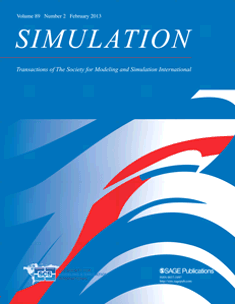
SIMULATION-TRANSACTIONS OF THE SOCIETY FOR MODELING AND SIMULATION INTERNATIONAL
Bridging Disciplines with Cutting-Edge Simulation ResearchSIMULATION-TRANSACTIONS OF THE SOCIETY FOR MODELING AND SIMULATION INTERNATIONAL, published by SAGE Publications Ltd, is a pivotal journal in the field of computer graphics, computer-aided design, mathematics, and modeling and simulation. With an ISSN of 0037-5497 and an E-ISSN of 1741-3133, the journal has established itself as a valuable resource since its inception in 1963, boasting a diverse archive leading up to 2024. Ranked in the Q2 category for both Computer Graphics and Mathematics, as well as Q3 for Modeling and Simulation and Software, it reflects a balanced distribution of quality research across multiple disciplines. The journal promotes accessibility through various open access options, ensuring wide dissemination of innovative findings. Researchers, professionals, and students alike will find insightful peer-reviewed articles that delve into advanced simulation methodologies and their applications in real-world scenarios, reinforcing its significant impact on the evolution of the simulation and modeling landscape.

NAVAL RESEARCH LOGISTICS
Exploring the Depths of Naval Logistics ExcellenceNAVAL RESEARCH LOGISTICS is a prestigious scholarly journal, published by WILEY, that serves as a vital platform for researchers and professionals in the fields of management science, operations research, ocean engineering, mathematics, and modeling and simulation. With an impressive impact factor and recognized as a Q1 journal in its respective categories, it reflects the highest standards of quality and rigor in research dissemination. Covering discussions from its inception in 1973 to the present, NAVAL RESEARCH LOGISTICS addresses key issues and innovations in logistics and operational challenges, particularly within the naval context, thus making significant contributions to policy and strategic decision-making. The journal is not currently available as an open-access publication, yet it provides rich insights essential for academics, industry experts, and students keen on advancing their knowledge in logistics and operations related to maritime applications. With a commitment to bridging theory and practice, this journal is an indispensable resource for anyone connected to the maritime logistics field.
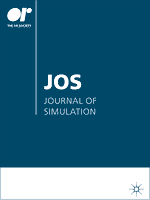
Journal of Simulation
Unleashing the Power of Simulation for Industry ImpactJournal of Simulation, published by Taylor & Francis Ltd, stands as a premier academic platform, addressing the intricate intersections of Industrial and Manufacturing Engineering, Management Science and Operations Research, Modeling and Simulation, and Software. With an ISSN of 1747-7778 and an E-ISSN of 1747-7786, this journal has established itself within the academic community, reinforced by its consistent ranking in the Q2 category across multiple fields as of 2023. The journal's coverage spans from 2008 to 2024, promoting innovative research and comprehensive reviews that influence industry practices and academic knowledge alike. Researchers, students, and professionals benefit from practical insights drawn from high-quality, peer-reviewed articles. Although the journal is not open access, its robust impact in the relevant fields, including a Scopus ranking placing it in the top 20% percentile in numerous categories, highlights its importance as a resource for advancing knowledge and fostering collaboration within the global simulation and modeling community.
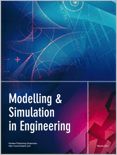
Modelling and Simulation in Engineering
Bridging Theory and Practice in Engineering ExcellenceModelling and Simulation in Engineering is a pioneering open-access journal, published by HINDAWI LTD, and established in 2007. With a focus on advancing the fields of engineering, computer science applications, and modeling and simulation, this esteemed journal serves as a vital platform for researchers, professionals, and students alike. The journal has made significant strides in its academic contributions, reflected in its current categorization within the Q3 quartile in Computer Science Applications, Engineering (miscellaneous), and Modeling and Simulation as of 2023. With a Scopus ranking of 133 out of 307 in General Engineering and 183 out of 324 in Mathematics' Modeling and Simulation, it emphasizes the crucial interplay between theoretical research and practical applications. Each article published in Modelling and Simulation in Engineering undergoes a rigorous peer-review process, ensuring high-quality research dissemination. By maintaining an open-access format, the journal promotes global collaboration and accessibility, supporting the dissemination and advancement of engineering knowledge worldwide. With its headquarters located in the United States, the journal is truly positioned at the convergence of innovation and research.